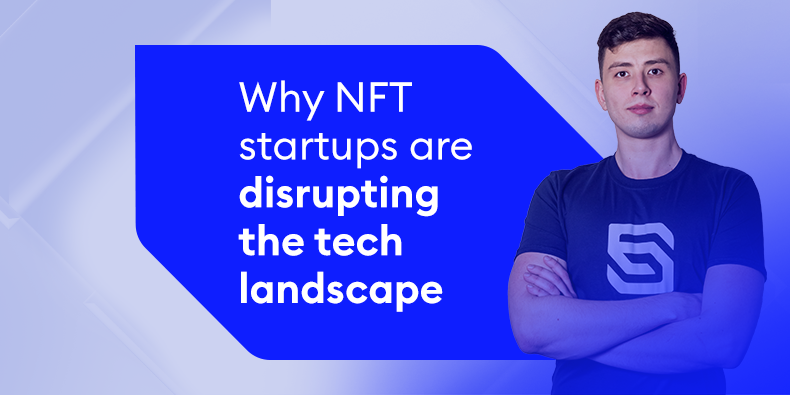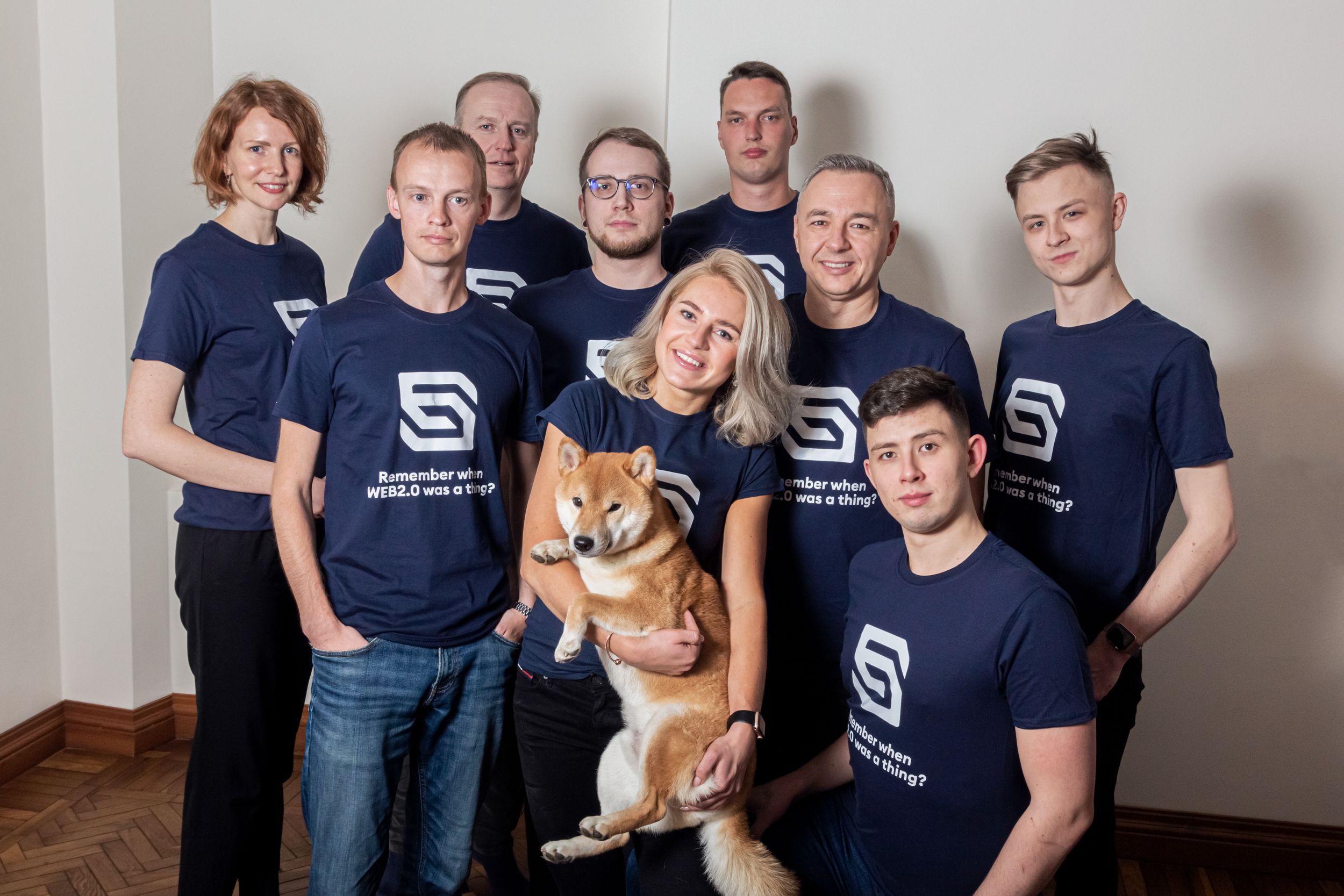
Our very own Sander Gansen is one of a growing number of tech CEOs, entrepreneurs, coders, business leaders and investors embracing blockchain technology, cryptocurrencies and NFT projects.
Despite the relatively new beginnings of the NFT space, the world is still accelerating its digitalisation.
NFT technology can provide unique, infallible data for this digital world in industries beyond digital art. You might wonder why Sander decided to take advantage of non-fungible tokens when launching his NFT startup with his co-founders.
"I'm fascinated by science and experimentation as long as it has the potential to change the course of humanity for the better. Facilitating the adoption of emerging technologies is one way I see to foster positive change. When it comes to blockchain technology, I see this as the next wave of computing that helps to democratise innovation, deliver digitalisation and introduce more trust between real-world businesses."
Why an NFT startup?
If you're new to this, you should know a few things. First, non-fungible tokens (NFTs) are digital representations of physical or digital items, such as software, music and artwork.
Once an NFT is created, it is stored on a blockchain, a digitally distributed (decentralised) public ledger across a network. Once the NFT is recorded, it cannot be modified or deleted, meaning that a permanent, secure and accurate historical record of transactions exists.
At first, NFTs were an experiment in digitising individual assets, popularised by using art as the asset. These assets are tradable on blockchain networks. Today, NFTs are more than digital art - they can store an unlimited variety of metadata.
Regarding next-gen tech development, enterprises and startups can benefit from developing NFT-based applications. More and more businesses are embracing purchasing NFTs by creating both long- and short-term value in reselling the NFTs, enhancing revenue opportunity and establishing a greater reach with a new audience.
Why do NFTs matter to startups?
Startups can leverage NFT technology to generate new ways to provide outstanding services to clients that may accelerate access to funding and help build communities.
No matter your startup's reason for wanting to explore NFTs - blockchain and NFTs are an endorsement of evolution. These concepts are revolutionising what we're able to do in the digital realm - from Generative Art, ticketing, and music events to the metaverse; startups are presented with endless opportunities to harvest the growth potential of NFTs.
As with the evolution of any industry (considering how the internet developed), NFTs result from next-gen technologies' influence in the digital world of things, continuing to impact the digital consumer experience. I see NFT technology as the infrastructure for a modern business model and providing valuable assets and utility for consumers and investors.
What are the perils of being an NFT company?

It can be overwhelming to decipher NFTs at first, so it's good to understand a few general aspects of NFTs and the industry before diving head-first into it all.
For starters, DAOs (decentralised autonomous organisations) and community governance are current topics of discussion. There are debates about the value and benefit of creator communities and creator economies having direct representation and sharing the advantages in the platforms they are using and creating value for.
Remember, NFTs don't have to be objects of immense value. They can be fun, trivial, entertaining and contain utility. NFT value begins accumulating when the NFT is associated with an item, listed on an online marketplace, and used to track or control the item's distribution or ownership (buying, selling, reselling).
In terms of the NFT marketplaces and trade, recent developments have established more trustworthy digital art galleries. What does this mean for artists, gamers and buyers? The opportunity to share and trade NFTs without the fear of a lack of security in protecting the art pieces.
Lastly, when entering the world of NFTs, it's important to stay respectful towards consumer needs and experiences. There have been criticisms against large multinational corporations using NFTs as a marketing gimmick or cash grab, from video games to movie franchises, alienating fans and consumers alike.
However, NFT and blockchain technology can be used by startups to empower and support their work in a way which rewards and provides value and entertainment to fans and collectors.
How do NFT companies disrupt the tech landscape?
NFT growth is continuously skyrocketing, and we shouldn't consider it a short-lived hype. However, one thing is sure - blockchain and NFTs will become an everyday practice for businesses and consumers in their daily activities over time. NFT companies will provide consumers, investors and all those involved with the following.
1. Greater transparency
The most disruptive aspect of NFTs is the incredible transparency it brings to the startup ecosystem. For instance, in terms of funding transparency, with an NFT launch as an MVP, the startup can Mint and then sell a decided amount of NFTs to early customers. The NFT sales indicate early investment proof and startup capital to the founders, which helps startups to stay on top of transparent transacting and helps them to stay safe from financial fraud.
This has contributed towards the success of startups that use NFTs to drive the core of their business. I see that startup investors are driving the NFT industry's growth potential with a rapid increase in value. Last year, Digital analytics firm DappRadar estimated NFT sales at $2.5bn in the first six months of 2021. By the end of 2021, the NFT market hit $22bn!
2. Proof-of-ownership
Considering trade, an NFT can be proof of ownership of the underlying work, given the nature of blockchain transactions. For example, startups can benefit from NFTs to limit and track the distribution of copyrighted or legally protected items being sold. Authenticating ownership of the item tied to the NFT makes it easier to identify pirated from licensed products.
3. More sustainability
Blockchain's environmental impact is significant, but it depends on which blockchain you are referring to. For example, the switch to Ethereum 2.0, known as the merge, has shown that the web3 ecosystem is more sustainable than traditional industries and cryptocurrencies like Bitcoin. Startups hold the opportunity to lessen the environmental impact of new-tech development. 21st-century consumers want a purpose-driven shopping experience and vote with their wallets.
Fostering sustainable practices in business strategies more visible to the public generates goodwill and customer loyalty. Retailers and Consumer Packaged Goods (CPG) companies that do not step up will get left behind by their customers.
Another study found that 77% of consumers want sustainable brands, and most are willing to change their shopping behaviours.
4. Increased property protection
Although blockchain is still being developed, a new revolution is taking place when considering intellectual property protection. Startups, especially those selling software and practising trading in digital art, can consider leveraging NFTs as an alternative to traditional intellectual property protection, such as trademarks.
5. Better UX
Regarding user experience, NFTs make security and accessibility less of a worry for creators and users. Many people who are not familiar or well-acquainted with blockchain technology see significant risk in using or investing in all forms of blockchain-based products. However, this technology has the potential to bring incredible benefits and virtues that can help the world in many ways, starting with redefining the user experience to make it more transparent.
Will NFT startups survive the crypto bubble?

As crypto continues to advance, the NFT space has seen a wave of participation from the tech industry's best and brightest. The result: NFT companies have garnered more than $3B in investment in the past year alone.
Whilst I concur that NFT projects that have been scams and frauds have provided some unscrupulous media headlines, like many new technologies - the internet and social media, web3 is not going away.
As web3 matures, it will be exciting to see how NFTs shape the future.
About Sander Gansen
Sander Gansen is a Draper University alumni with a non-academic degree in business and startup building and is a serial tech entrepreneur who established or helped to grow various other businesses, including Springrise (marketing strategy & execution agency), Speys/Shipitwise (logistics & supply chain management tool) and Robotex (global robotics education network). Sander's prior experience includes working in Startup Wise Guys, a private capital accelerator and investment fund and teaching entrepreneurship at multiple Estonian universities.
He is the CEO of WOF Labs, the team behind World of Freight and Supplain.

![Here are the best NFT games [Updated List]](https://strapi.supplain.io/uploads/What_is_so_special_about_a_World_of_Freight_NFT_and_what_will_move_the_project_forward_b89946b520.png)
